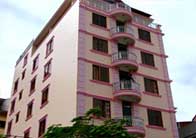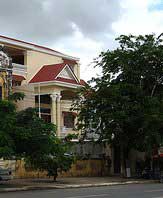Inheritance tax and inheritance law in Cambodia
The Global Property Guide looks at inheritance from two angles: taxation, and what inheritance laws apply to foreigners leaving property in Cambodia: what restrictions there are and whether making a will is advisable.
INHERITANCE TAX
There are no taxes on inheritance or estates in Cambodia.
By law, foreigners must apply for citizenship to be able to inherit property in Cambodia. But if the property is being held through a resident company, such disadvantages are avoided.
INHERITANCE LAW
By law, foreigners must apply for citizenship to be able to inherit property in Cambodia. But if the property is being held through a resident company, such disadvantages are avoided.
Thanks to
Socheata Seng of BNG-Advocates & Solicitors
Cambodia´s laws affect everyone who owns property in Cambodia.
The main laws concerning inheritance are:
- Constitution 1993,
- Land Law 1992 and 2001,
- Family Law 1989,
- Inheritance Law 1972,
- Code of Civil Procedure 2006, and
- Commercial Enterprise Law 2005
The Draft of Civil Code 2006 is currently being adopted, but some provisions of Inheritance Law 1972 that do not contravene the current laws are still effective.
Under the Cambodian Constitution, no distinction is made between foreigners of different nationalities or religions.
Yet although foreigners and Cambodians are treated the same, the owner of real property registered in Cambodia must be a Cambodian citizen.

According to Draft of Civil Code, Article 1155, an inheritor who is not Cambodian cannot own real property in Cambodia through inheritance. The estate becomes a legal entity which must be sold by the foreigner within three months, and the value of the estate distributed to the heirs (including foreigners) according to the law or the will, and then, the entity is dissolved.
If the estate can not be sold within three months, it must be delivered to an inheritor in the next rank who is a Cambodian citizen, and then the entity is dissolved.
The court where the property is situated has jurisdiction.
In Cambodia, the municipal or provincial court has jurisdiction over all lawsuits. The general principles concerning jurisdiction over property are:
- Issues concerning property rights are resolved by the court where the property is situated.
- Lex rei sitae: Cambodian laws apply to property situated in Cambodia.
In practice, lex fori applies to the ownership of immovable property in Cambodia, whereby the Cambodian court applies Cambodian laws to all claims submitted to it.
No legal provision specifies how long an inheritance case takes in the court. It depends on the complexity of each case.
There is a reserved portion, usually half of the estate.
The general reserved portion for descendents is one half of the whole estate. Through a will, parents can dispose of the other half of their property to persons other than their surviving descendants, unless the latter are disinherited. If the surviving heirs are the deceased´s parents or grandparents, the reserved portion is one third of the whole estate. These rules also apply to foreign heirs.
Intestacy
In case of intestacy, according to Draft of Civil Code 2006, the deceased´s property goes first to the descendants (including adopted children) of the deceased. In the absence of descendents, the estate goes to the ancestors. If there are no ancestors, the property goes to the siblings. A spouse is an heir of class number five, therefore a surviving spouse of the deceased is also an inheritor. If the deceased has no living spouse or relatives, the property goes to the State.
The non-reserved residue of the estate can be freely distributed by the property owner, without restriction, except that some people are legally excluded from inheritance (e.g. the doctor of the deceased, a priest present at the time of death, or people considered "unworthy" (e.g. a person accused of murdering the deceased)). If the testator includes such people in a will, the will still valid, but the judge will declare null the stipulations which give the inheritance to the unworthy people, if there is a claim to the court.
It is quite normal to make a will in Cambodia.

Under Inheritance Law 1972, a will in Cambodia can be established through either a certified or a private deed. A certified deed is dictated by the testator, in the presence of the local "mekhum" (commune chief) assisted by two witnesses, who must not be legatees or heirs. A will must be dated and include the names, ages and domiciles of the witnesses. After the will is read out aloud by the mekhum, the testator, witnesses, and mekhum must append their signatures. The mekhum must mention on the will if the testator and witnesses are illiterate. A private deed is entirely written and signed by the testator in Cambodia.
The Draft of Civil Code 2006 defines how the will must be formed. The will can be made as an authentic document or as a private or secret one. Each type of will has its own formality to be respected.
Cambodian laws do not provide explicit guidance for inheritance from foreigners who own assets in Cambodia. If the inheritance law of a foreigner is more favorable than Cambodian Law, then it is recommended that he/she should make a will under his/her national law. On the contrary, if Cambodian Law is more favorable, then it is advisable for him/her to make a local will.
In principle, if a foreigner with assets in Cambodia makes a will under his/her national law, and if his/her national law does not include a reserved portion, he has to respect the reserved portion if such portion is part of the public order provided by law. But, under the Cambodian law, we don´t know whether it enters the notion of public order, as neither the law nor the Cambodian courts have ever mentioned or decided on this matter.
A will made by a foreigner under his national law does not need to be authenticated by the authorities in Cambodia. If a foreigner wants to validate a local will, he/she must be present in Cambodia. A lawyer in Cambodia can draft a will for a foreigner, but the testator needs to be there to sign the will. The signature of the lawyer has value as a witness.
An owner can give away his property, before death.
It is necessary for gifts of real property in Cambodia to be legally recorded. The transfer of ownership needs to be done through registration at all levels of the land offices.
After the death of the owner, any gifts of property which included the reserved portion can be legally challenged by the heirs who are entitled to receive the reserved portion. The heirs also have rights to claim abatements to preserve their reserved portions. Abatement commences with the latest gifts and extends in successive order to the earliest gift.
Ownership of property is recorded on title deeds.
Cambodian laws look primarily at the name on the title deeds to determine the ownership of real property. All property transfers, including transfers through inheritance, are recorded in the Cambodian land registration system.
In addition to title deeds, the concept of legal possession is protected in Cambodia. A legal possessor who owned an estate before August 31, 2001 is protected by Cambodian Land Law. Such legal possession can be transferred by inheritance.
Minors can own property.
The Cambodian Constitution and Land Law 2001 do not mention the legal age of ownership of real property. However, the property of a minor must be administered by a curator or living parent. A guardian can be also be nominated in a will or by a civil court.